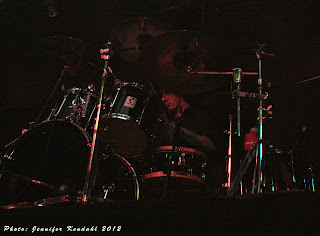The club owner was nice enough. As far as staging the equipment, there was lots of room. That makes it enjoyable. If you have a place to set up and leave your gear, it's so much better all around. The PA sounded good, as I watched both bands play before we went on. I took note of how they sounded, and what to expect from the sound engineer. If the opening bands complain on stage about the monitors or feedback, then you might want to be prepared to expect the same problems too. Then again, the sound man might need the first two bands to get through before he can actually dial in a good sound. This was not the case. The bands were having a great time on stage, and you could tell that the engineer knew what he was doing.
My drum set can present problems for sound guys. Since I am an open handed drummer, my cymbals are not where you would expect them to be. I also like to have my crash cymbals close to the top of the rack toms. When I scoped out how the sound guy had set up his microphones for the first two bands, I knew that he would have to try something else for me. When it came time to set up my kit, he had no problems. That was until he saw my wood hooped snare drum. He hoped to clamp his microphone to the drum rim, but you can't clamp a microphone to a wood hoop. Luckily, he had a spare upright snare stand. We dialed in the
drum sound, guitar, and Bass in just under 15 minutes.
Watch Out For The Shifting Drum Riser
The only problems cropped up while I was playing. My drum set was shifting all over the riser. The riser seemed solid to me, and I had inspected it before the first band set up their gear. It didn't wobble, and was just big enough for me to fit all my drums up in the way that's easy for me. What I didn't realize was that the vibration from playing my bass drum would send my cymbal stands buzzing around like that vintage electronic football machine. The longer into the night, the more those stands (and cymbals) were shifting forward and to the right. I started to think about how I would approach the one song in the set that would be problematic with the way that my gear was shifting. I compensated by "hunkering down." I tried to keep my arms in tight, and used my wrists. It paid off, because I don't remember having any issues during that song.The set was short to begin with, and it felt like it went by in minutes. That was something that I forgot about. Time speeds up. There was one final thing that I did forget about. I forgot that most club owners will not pay you until the end of the night. That means you should expect to be hanging around until the bar closes, or something close to that time. All in all, it felt good to be back behind the drums.

No comments:
Post a Comment